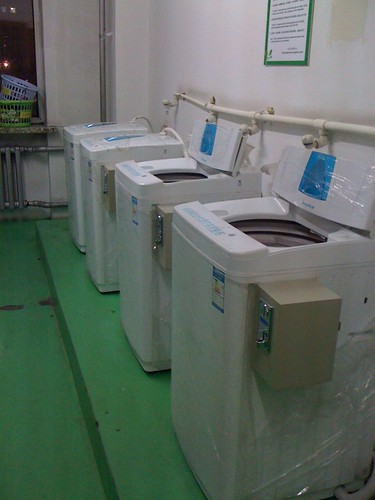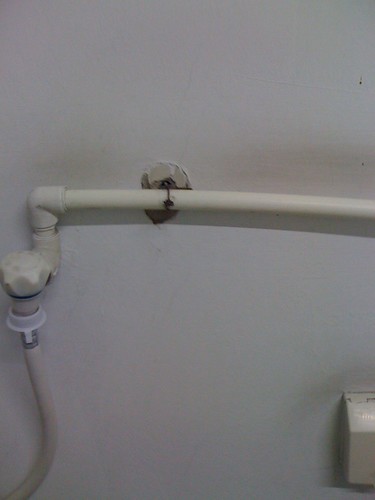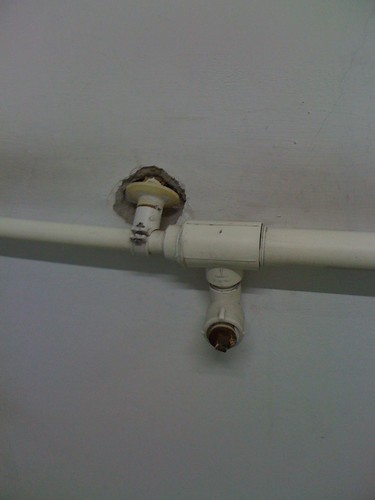Development
Read/Post Comments (4)
I think that in the US, we tend to misunderstand what it means to say that China is a developing nation. We tend to look at its economic position and overestimate its clout, and we certainly don't understand the day to day life of its people.
One of the big things I notice here is that development is very uneven. Case in point: Yesterday, I went to the laundry facilities in my dorm to wash my clothes. I was greeted by a row of brand spanking new washing machines:

. . . but when I looked a little closer, I discovered that the pipes that bring water to the machines were suspended in this manner:


Now, why is this? Why would one of the richest universities in China - one where they can clearly afford new machines - allow the pipes to be suspended in this manner? Is it because there's no money to fix the pipes properly?
I don't think so. I think, actually, it's because people genuinely feel that if a 25-cent solution will work, why bother with the more expensive fix? I find this attitude all across the board in China - among people of limited means, and among people who are wealthy. Why buy something if you can borrow it from a neighbor? If you can borrow something and you buy it, people think you're foolish.
It's the kind of attitude that hearkens back to Depression-era thinking in America, to my mind. Whenever I see a small piece of ingenuity like the way that the pipes are suspended in the pictures above, I think of my Uncle Gene, who was frugal to the bone, and just as inventive. Why waste money, when the work of your brain and the objects you have at hand will solve your problem?
It's a way of thinking that has largely gone by the wayside in the US, I think. Now, we tend to think that if someone can't afford (or chooses not to afford) a plumber who can fix such problems in a gold standard manner, then there's something wrong with that person.
Overall, I think that when we substitute money for ingenuity, we lose. We lose part of our autonomy (because we need to work more and more to meet our needs) and we lose part of what makes us human. I think people have an inborn desire to learn and to create, to flex our mental muscles to meet the challenges of our lives.
I'm not meaning to advocate lousy plumbing. I mean to say that when we reach for our pocketbook instead of reaching inside our minds, we make ourselves that much more helpless. In a place where people don't have the option of paying their way out of everything, it becomes much, much easier to see what we in the US have lost. Our lives might be softer, but I am not at all sure that they are better. How much is really enough? We have so much more than enough that I can't begin to know the answer to that question. At some point, we reach the point of diminishing returns.
That point is the point I want to discover while I'm here. Lots more to say about that - including some cogitation on the fact that I want to learn how to live with less from people who ardently want more - but I don't have time now. My friend Barb is here, and tomorrow we're off to Beijing - so expect pictures in the upcoming days . . .
One of the big things I notice here is that development is very uneven. Case in point: Yesterday, I went to the laundry facilities in my dorm to wash my clothes. I was greeted by a row of brand spanking new washing machines:

. . . but when I looked a little closer, I discovered that the pipes that bring water to the machines were suspended in this manner:


Now, why is this? Why would one of the richest universities in China - one where they can clearly afford new machines - allow the pipes to be suspended in this manner? Is it because there's no money to fix the pipes properly?
I don't think so. I think, actually, it's because people genuinely feel that if a 25-cent solution will work, why bother with the more expensive fix? I find this attitude all across the board in China - among people of limited means, and among people who are wealthy. Why buy something if you can borrow it from a neighbor? If you can borrow something and you buy it, people think you're foolish.
It's the kind of attitude that hearkens back to Depression-era thinking in America, to my mind. Whenever I see a small piece of ingenuity like the way that the pipes are suspended in the pictures above, I think of my Uncle Gene, who was frugal to the bone, and just as inventive. Why waste money, when the work of your brain and the objects you have at hand will solve your problem?
It's a way of thinking that has largely gone by the wayside in the US, I think. Now, we tend to think that if someone can't afford (or chooses not to afford) a plumber who can fix such problems in a gold standard manner, then there's something wrong with that person.
Overall, I think that when we substitute money for ingenuity, we lose. We lose part of our autonomy (because we need to work more and more to meet our needs) and we lose part of what makes us human. I think people have an inborn desire to learn and to create, to flex our mental muscles to meet the challenges of our lives.
I'm not meaning to advocate lousy plumbing. I mean to say that when we reach for our pocketbook instead of reaching inside our minds, we make ourselves that much more helpless. In a place where people don't have the option of paying their way out of everything, it becomes much, much easier to see what we in the US have lost. Our lives might be softer, but I am not at all sure that they are better. How much is really enough? We have so much more than enough that I can't begin to know the answer to that question. At some point, we reach the point of diminishing returns.
That point is the point I want to discover while I'm here. Lots more to say about that - including some cogitation on the fact that I want to learn how to live with less from people who ardently want more - but I don't have time now. My friend Barb is here, and tomorrow we're off to Beijing - so expect pictures in the upcoming days . . .
Read/Post Comments (4)
Previous Entry :: Next Entry
Back to Top